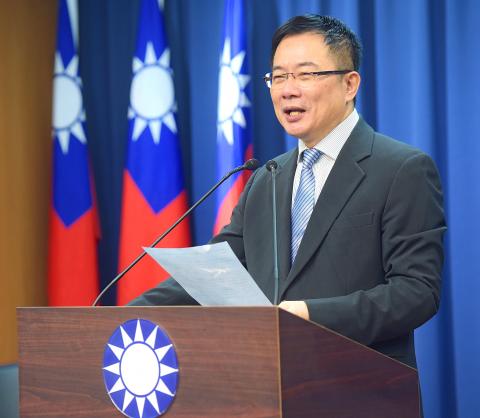The majority of Taiwanese support the Chinese Nationalist Party’s (KMT) new policy platform that aims to end cross-strait hostility through a peace accord, despite it sparking heated debates within the party, the results of KMT surveys released yesterday showed.
KMT Culture and Communications Committee deputy director Hung Meng-kai (洪孟楷) said a survey conducted by a private polling center at the KMT’s behest on Aug. 28 and Aug. 29 found that 51.5 percent of the 1,078 respondents supported the KMT’s new policy platform, while 20.2 percent did not.
“They were asked whether they think the KMT should put forward a ‘peace-centered policy platform,’ one that endeavors to further the [so-called] ‘1992 consensus’ based on the foundation of the Republic of China [ROC] Constitution and actively explore the possibility of putting an end to cross-strait hostility through a peace accord,” Hung told a news conference at the KMT headquarters in Taipei.

Photo: Huang Yao-cheng, Taipei Times
Hung said another telephone-based poll carried out from Oct. 21 to Tuesday last week that queried more than 600,000 Taiwanese also yielded a similar result.
About 51.7 percent of the respondents in this month’s survey voiced support for the KMT’s endeavors to find a “way out” for Taiwan amid damage caused to the nation’s trade and tourism industry by the Democratic Progressive Party’s (DPP) “isolationism and anti-China policy,” and to promote the party’s new policy platform of peaceful cross-strait exchanges, Hung said.
The KMT’s new policy platform, approved by the party’s national congress on Sept. 4, has been a topic of heated debate within the KMT, as it mentions the “different interpretations” component of the “1992 consensus” only once and omits what the pan-blue camp has considered an integral element in the political framework in following sentences.
Critics have said that the new platform is an attempt by KMT Chairwoman Hung Hsiu-chu (洪秀柱) to move the KMT closer to the concept of “one China, same interpretation.”
The “1992 consensus” refers to a tacit understanding between the KMT and Beijing that both sides of the Taiwan Strait acknowledge there is “one China,” with each side having its own interpretation of what “China” means. Former Mainland Affairs Council chairman Su Chi (蘇起) in 2006 said he had made up the term in 2000.
Citing another survey conducted earlier this month among 1,068 respondents, Hung Meng-kai said that 45.9 percent of those polled believed that the KMT should continue exchanges and communication with Beijing for the sake of peaceful cross-strait development and people’s livelihood, compared with 34 percent who disagreed.
“These figures suggest that the KMT’s peace-centered policy platform, which was proposed to counter the DPP’s independence guidelines, conform to mainstream public opinion and is recognized by most Taiwanese,” he said.

A Vietnamese migrant worker on Thursday won the NT$12 million (US$383,590) jackpot on a scratch-off lottery ticket she bought from a lottery shop in Changhua County’s Puyan Township (埔鹽), Taiwan Lottery Co said yesterday. The lottery winner, who is in her 30s and married, said she would continue to work in Taiwan and send her winnings to her family in Vietnam to improve their life. More Taiwanese and migrant workers have flocked to the lottery shop on Sec 2 of Jhangshuei Road (彰水路) to share in the luck. The shop owner, surnamed Chen (陳), said that his shop has been open for just

Global bodies should stop excluding Taiwan for political reasons, President William Lai (賴清德) told Pope Francis in a letter, adding that he agrees war has no winners. The Vatican is one of only 12 countries to retain formal diplomatic ties with Taiwan, and Taipei has watched with concern efforts by Beijing and the Holy See to improve ties. In October, the Vatican and China extended an accord on the appointment of Catholic bishops in China for four years, pointing to a new level of trust between the two parties. Lai, writing to the pope in response to the pontiff’s message on Jan. 1’s

TAKE BREAKS: A woman developed cystitis by refusing to get up to use the bathroom while playing mahjong for fear of disturbing her winning streak, a doctor said People should stand up and move around often while traveling or playing mahjong during the Lunar New Year holiday, as prolonged sitting can lead to cystitis or hemorrhoids, doctors said. Yuan’s General Hospital urologist Lee Tsung-hsi (李宗熹) said that he treated a 63-year-old woman surnamed Chao (趙) who had been sitting motionless and holding off going to the bathroom, increasing her risk of bladder infection. Chao would drink beverages and not urinate for several hours while playing mahjong with friends and family, especially when she was on a winning streak, afraid that using the bathroom would ruin her luck, he said. She had

MUST REMAIN FREE: A Chinese takeover of Taiwan would lead to a global conflict, and if the nation blows up, the world’s factories would fall in a week, a minister said Taiwan is like Prague in 1938 facing Adolf Hitler; only if Taiwan remains free and democratic would the world be safe, Deputy Minister of Foreign Affairs Francois Wu (吳志中) said in an interview with Italian newspaper Corriere della Sera. The ministry on Saturday said Corriere della Sera is one of Italy’s oldest and most read newspapers, frequently covers European economic and political issues, and that Wu agreed to an interview with the paper’s senior political analyst Massimo Franco in Taipei on Jan. 3. The interview was published on Jan. 26 with the title “Taiwan like Prague in 1938 with Hitler,” the ministry